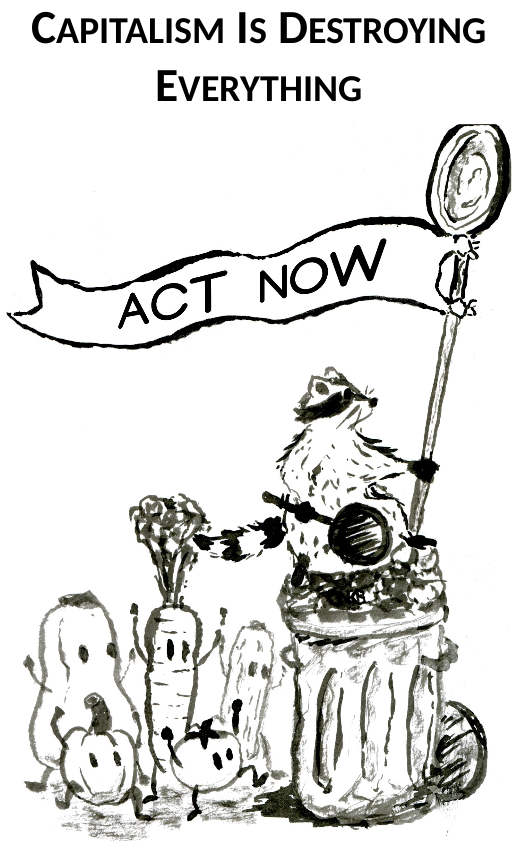
Identifying climate denial exclusively with the various far right politicians that in the recent years rose up worldwide, would be naive and absurd. It is capitalism itself to be denying the climate crisis.
Capitalism is sometimes explicitly a climate-denier: this is the case, for example, of Exxon Mobil and other giants of the fossil fuel industry that have been financing for years the activity of presumed “skeptical scientists”. Mostly, however, Capitalism is implicitly denier, due to its fundamental logic. It is so in the way it keeps moving forward despite everything, in the way it takes itself for granted as the one and only possible mode of production: eternal, despite its destructiveness.
The culture of “capitalist realism” is all around us.
It is not only the politicians’ debate to be full of denial (their passivity, their going forward as automs, if not their direct servitude to the interests of big polluters) but the public discourse as a whole.
Let’s debunk any misunderstanding from the start: “climate-denial” does not exclusively mean denying that climate disruptions are currently happening. Today most of the people are aware that something serious is going on. Media are talking almost every day of the disastrous consequences of global warming.
The problem is that these are being framed as the single extraordinary episode breaking for a moment the triviality of the day to day. It breaks down the picture, it fragments the image of climate collapse and describes each single piece with words that sound alarmist but are actually reassuring. Media talk about “sea storms”, “heat waves”, “dry-seasons”, in short, about “emergencies”: things that appear sudden, momentaneous and local. Because emergencies will eventually ‘get back to normal’, after covering news about climate, one can move to something else.
This moving to something else is the core of the dominant ideology manifesting itself in the media. Treating the climate catastrophe as one of the many possible topics is the most wicked form of climate-denial.
The same fragmentation of the picture is at work in the practices of green-washing of Shell and other companies, in the empty promises of politicians, in the totally superficial plans of “ecological sustainability” done by local municipalities and governments. The spectacle of the adoption of this or that “mitigative measure” is there to tell us: «Don’t worry, the problem can be dealt with without changing the system, without upsetting completely our routine, without giving up to business-as-usual».
Business-as-usual that then comes back reassured and strengthened.
This also applies to the so-called “climate emergency declaration”, as with this, despite the good intentions of the movements pushing for it, the risk is to serve green-washing on a golden plate to the institutions that can use the nice gesture as a diversive.
And this is indeed what we’ve seen in Utrecht. The gemeente of the “linkse lente”, after declaring climate emergency went straight back to the business-as-usual. So back to work on pushing forward with Utrecht as the “fastest growing city in the Netherlands”. Back to work with gentrifying neighborhoods, replacing social housing with houses for rich people – but now with a park, and no cars! (see Croeselaan). Back to promoting Utrecht as a tourist destination with La Vuelta – but let’s make it sustainable!
These and other policies are all manifestations of “green neoliberalism”, of the politics of who wants to tame deregulated capitalism with a green face under the “Green Capitalism” brand.
The moderate demands formulated in this context quickly reveal that the sacred principles of the market, hidden behind the “cloak of feasibility”, should not be touched in this process. But the contradiction between profit interest and ecological sustainability is always resolved within the system at the expense of the environment and ultimately everybody.
It becomes therefore clear that we cannot trust politicians nor businesses to solve the problems that they contributed to create and keep on creating. What do we do then if arguments are not enough, if formulating demands does not change anything?
What we want is not the “march through the institutions”, but rather to become a movement that can implement an alternative itself. Not to trust in the state, to know one’s own strength and to be able to formulate concrete alternatives is one of the most inspiring things that we see now happening in Rojava. The revolution in Rojava proves that people, in the harshest conditions, are still able to self-govern themselves and build their own institutions for a radical democracy that makes space for women’s liberation and fights for an ecological future.
But we cannot stand idle and hope to be in another place or in another time. We need to do what we can here to start refusing and fighting this climate-denier capitalist system and to start building those alternatives. Like the people that are distributing Zapatista coffee or Vio.me soap to sustain here anti-capitalist economies, like the people that occupied the Lutkemeerpolder and created a community garden on what the “green” gemeente of Amsterdam wants to become yet another space for capitalist speculation, like the work we do with our kitchen and library, using capitalist’s trash as a way to feed people and create spaces following different logics.
Capitalism is destroying everything,
Act now!
The Barricade
